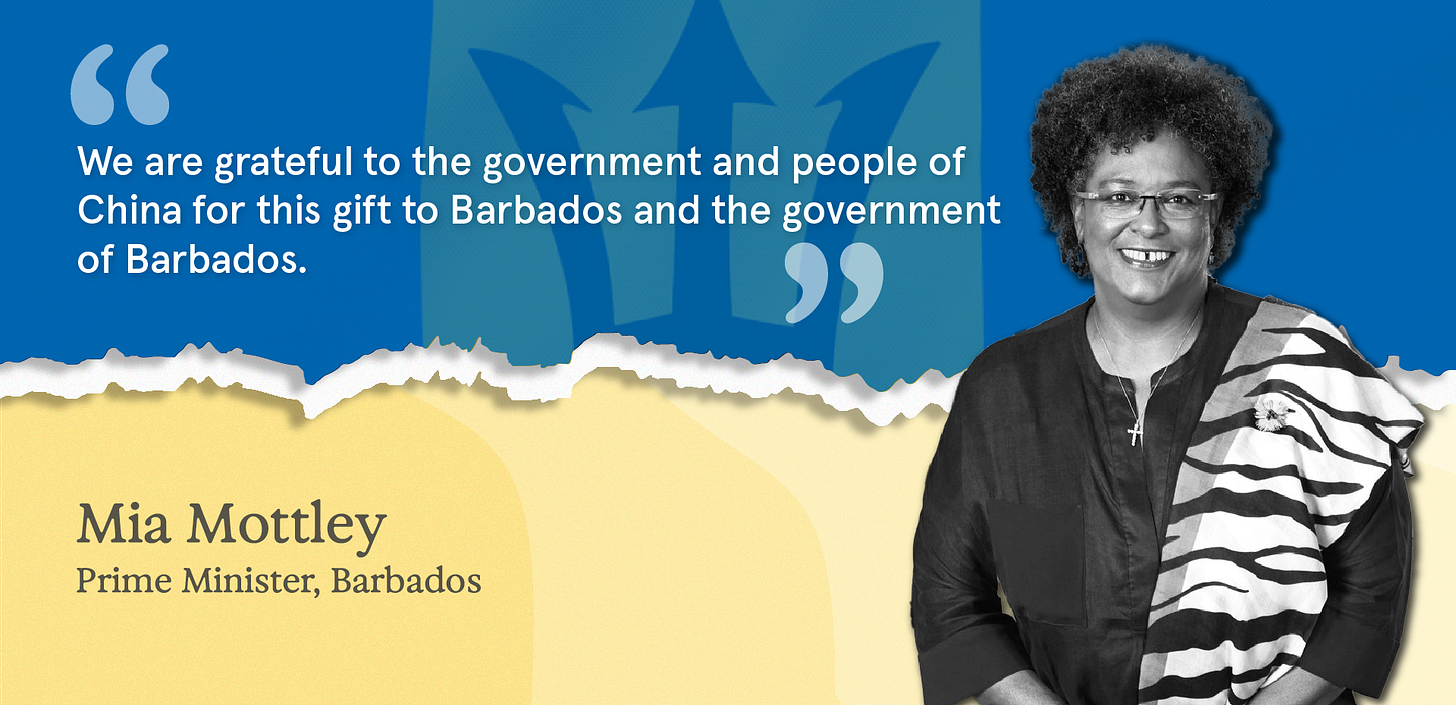The Gift of Gratitude
Nicaragua's canal goes bust, visits to Venezuela, a stadium in Barbados, and accusations about Haiti
Welcome to Chaufa, a China-Western Hemisphere Newsletter by CPSI.
Today’s Edition covers May 6 to May 13.
The Top 5 Stories:
More than a decade after Nicaragua and a corrupt Hong Kong businessman tried to build a transoceanic canal through the Central American country, Ortega’s government effectively terminated the project by officially canceling the company’s concession. (La Prensa)
The Nicaragua Canal project dates back to 2012 when the Ortega regime and the privately-owned Hong Kong Nicaragua Canal Development Group (HKND) signed an MOU on the megaproject. The project prompted sizable protests from local civil society and was considered practically “dead” after the project’s main investor, Wang Jing, lost more than 80% of his $10 billion fortune.
The deputy director of the CCP’s International Department Chen Zhou traveled to Venezuela to meet with PSUV and foreign ministry officials.
The meeting comes as Maduro’s eldest son stated that Caracas was open to paying its debt to Beijing, while the Venezuelan Chinese Association held its annual conference and said it would refocus on education and investment issues.
As a direct China-Cuba flight relaunched, the Caribbean island announced that it would offer visa-free travel for Chinese passport holders.
Cuba joins the Caribbean countries of Antigua and Barbuda, Bahamas, Barbados, Dominica, Grenada, and Suriname, as well as the South American nation of Ecuador, which already provide visa-free access for PRC citizens.
Taiwanese Foreign Minister Joseph Wu accused China of “infiltrating” Haiti, though he did not clarify his comments nor did he indicate that he thought that Haiti would imminently flip recognition to Beijing.
The Republic of China currently enjoys formal relations with 11 UN member states (plus the Vatican). The most recent country to break ties with Taipei was Nauru earlier this year, but Honduras broke relations in 2023 and Nicaragua started recognizing the PRC in 2021.
Prime Minister Mottley said that she hoped would break ground on a new $40 million national stadium funded by a Chinese grant in the coming months now that the stadium’s design has been completed.
Core Brief
Chinese Megaprojects: It’s Better to Hold Your Breath
The news that the Nicaragua Canal project was officially called off was a bit of a surprise. This wasn’t because the project had a good shot of competing with the Panama Canal. It was more the opposite. Given that the project’s main funder lost 80% of his fortune nearly a decade ago and that the PRC government never seemed that wild about a project in a country it didn’t even have an embassy, the project appeared to be more of a figment of local imaginations than a tangible reality.
The story of the Nicaragua Canal and its demise on its own isn’t all that important. But the project is symbolic as one of many Chinese-financed infrastructure megaprojects that stalled or never got off the ground.
The recent history of China’s financing, investment, and construction projects is littered with examples of failed infrastructure works. There aren’t solid numbers on what percent of Chinese-backed projects don’t make it to the ribbon-cutting stage. But Venezuela’s promised rail system, proposed “dry canals” in Colombia, and massive hydroelectric dams in Argentina’s Patagonia region are just a few examples of projects that captured more in global headlines than they did in dollars spent or dirt excavated.
This is not to say that Chinese capital and building expertise never pays off. Projects like the soon-to-open Port of Chancay in Peru, the troubled Ecuadorian Coca-Codo Sinclair dam, the Jamaican North-South highway, and the gleaming new Chinese-built library in El Salvador all show how Chinese businesses can build notable new works. Additionally, projects like the apparently soon-to-be-built National Stadium in Barbados that fall behind the aggressive schedules their politicians advertise ultimately do work out in the end.
All countries and contractors at one point or another fall behind schedule or fail to complete a project. But given the alarm often given to the Belt and Road Initiative and Chinese overseas construction, these considerations are even more important when assessing Chinese-backed projects.
New infrastructure often runs into local opposition, corruption scandals, a sudden lack of funds, or sometimes just a general lack of feasibility, and Chinese projects are no exception. Regardless of the reason though, the checkered history of China’s development of infrastructure projects across the Western Hemisphere suggests that the general public and policymakers alike should take promises of grand new Chinese infrastructure projects with a grain of salt.

The Roundup
Politics and Society
The Chinese foreign ministry congratulated Jose Raul Mulino on his election as Panama’s next president, saying that “China attaches great importance to Chinese-Panamanian relations and is willing to work with Panama to improve mutual political trust, strengthen mutually beneficial cooperation.” (Xinhua) (FMPRC)
The Canadian government is moving forward with a foreign agent registry law that would seek to prevent future Chinese meddling in the country’s elections. The Global Times called the bill “another attempt to stoke hostility toward China.”
China’s Deputy Commerce Minister met virtually with Peru’s Deputy Foreign Minister for the two governments’ Joint Intergovernmental Commission on Economic and Technical Cooperation. The two sides reportedly discussed trade facilitation, science and technology, education, health, and investment.
Investment, infrastructure, and finance
The head of the U.S. International Development Finance Corporation told Congress that his organization was struggling to compete with China’s BRI, especially in Latin America.
Chinese oil firm Sinopec is seeking an offtake agreement and equity stake in Canada’s Pembina Pipeline’s Cedar LNG project to purchase 1.5 million tons of LNG production per year.
Speaking to the Hemispheric Security Conference in Miami, U.S. SOUTHCOM Commander Laura Richardson claimed that “Latin America does not benefit from the resources that China extracts from the region.”
China Harbor is reportedly interested in investing in a rural airport project to benefit the Colombian coffee industry.
Trade and Technology
Following the Chinese-Ecuadorian FTA came into effect, the Ecuadorian shrimp and banana industries, as well as the Chinese autos sector, were poised to benefit from the agreement.
Just weeks after Mexico raised duties on more than 500 goods to protect its domestic industry, the country lowered tariffs on aluminum imports (which will likely help Chinese businesses) “amid shortages of the material for the auto and electronics industries.”
New Chinese shops selling cheap PRC wares are apparently running local Nicaraguan small businesses, according to an investigation by Confidencial.
The Dominican Republic’s newspaper Hoy covered how disappointingly few Chinese tourists have visited in the five years since the two countries established ties, with only 65,000 Chinese citizens have traveling to the DR.
Chilean fruit firm Copefrut signed an agreement with Chengdu Zhongyi to facilitate more fruit trade between the two countries, especially with regards to cherries.
China and Mexico held a “Maize Cultural Dialogue” in Liaoning to discuss corn “scientific breeding, cultivation and processing technologies.” (China Daily)
Taiwan
Paraguay’s president said that Brazilian President Lula da Silva, as well as they country’s domestic agriculture industry, had been pressuring him to flip recognition to Beijing. However, he promised that he would remain with Taiwan during his presidency.
St. Kitts and Nevis PM Terrance Drew signed an agreement on the new JNF hospital with Taiwanese construction company OECC.
In an indication of how Taiwan-based businesses are increasingly looking to invest in Mexico, Taiwan’s and Mexico’s Citi Group subsidiaries and the Mexican Trade Office’s head held a forum in Taipei to support local companies looking to invest in North America.
The National Assembly of St. Kitts and Nevis passed a resolution that backed Taiwan’s inclusion in the UN, Interpol, ICAO, the U.N. Framework Convention on Climate Change, and the World Health Organization.
ROC and Belizean officials held a groundbreaking ceremony for a “new state-of-the-art sheep barn at the Yo-Creek Agriculture Station” as part of the USD $625,000 “Breeding Sheep and Goat Production and Guidance System Enhancement Project.”
Society and Culture
Beijing and Washington quietly resumed deportation cooperation for Chinese migrants who illegally enter the United States.
New data from Ecuador suggests that the number of Chinese nationals traveling to the country jumped from 5,000 in 2022 to nearly 24,000 in 2023, beating out the previous record of 14,985 visitors in 2014.
An analysis from the Niskanen Center argues that this jump is due in large part to Chinese citizens look to migrate to the United States rather than tourism.
Analysis and Opinion
Writing for The Diplomat, Evan Ellis suggests that the Chinese government’s and Chinese firms’ expansion in “Nicaragua, Honduras, and El Salvador [raises] strategic concerns due to the region’s proximity and connection to the United States.”
Connor Pfeiffer and Ryan Berg argue in Foreign Policy that following U.S. and Mexican elections this year, “both countries will need to address China’s presence in Mexico while maintaining a productive bilateral relationship.” For example, they argue that U.S. officials should “communicate to their Mexican counterparts clear red lines on sectors where heavy Chinese involvement threatens U.S. interests.”
Considering China’s growing trade and investment in Latin America, Ricardo Lopes Kotz finds in The Diplomat that “Chinese investments in Latin America are shifting to focus on decarbonization and renewable energies, using technologies that are strategic for the future of the global economy.”
A new academic article by Jian Ren in Business History studies China’s market entry strategies in Latin America during the Maoist era.
That’s it for now, see you again in two weeks!
Make sure you don’t miss the next issue of Chaufa 👇







